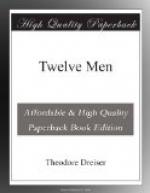But the thing which haunts me, and which was typical of him then as throughout life, was the spirit which he then possessed and conveyed. It was one of an agile geniality, unmarred by thought of a serious character but warm and genuinely tender and with a taste for simple beauty which was most impressive. He was already the author of a cheap songbook, “The Paul Dresser Songster” ("All the Songs Sung in the Show"), and some copies of this he had with him, one of which he gave me. But we having no musical instrument of any kind, he taught me some of the melodies “by ear.” The home in which by force of poverty we were compelled to live was most unprepossessing and inconvenient, and the result of his coming could but be our request for, or at least the obvious need of, assistance. Still he was as much an enthusiastic part of it as though he belonged to it. He was happy in it, and the cause of his happiness was my mother, of whom he was intensely fond. I recall how he hung about her in the kitchen or wherever she happened to be, how enthusiastically he related all his plans for the future, his amusing difficulties in the past. He was very grand and youthfully self-important, or so we all thought, and still he patted her on the shoulder or put his arm about her and kissed her. Until she died years later she was truly his uppermost thought, crying with her at times over her troubles and his. He contributed regularly to her support and sent home all his cast-off clothing to be made over for the younger ones. (Bless her tired hands!)
As I look back now on my life, I realize quite clearly that of all the members of my family, subsequent to my mother’s death, the only one who truly understood me, or, better yet, sympathized with my intellectual and artistic point of view, was, strange as it may seem, this same Paul, my dearest brother. Not that he was in any way fitted intellectually or otherwise to enjoy high forms of art and learning and so guide me, or that he understood, even in later years (long after I had written “Sister Carrie,” for instance), what it was that I was attempting to do; he never did. His world was that of the popular song, the middle-class actor or comedian, the middle-class comedy, and such humorous aesthetes of the writing world as Bill Nye, Petroleum V. Nasby, the authors of the Spoopendyke Papers, and “Samantha at




